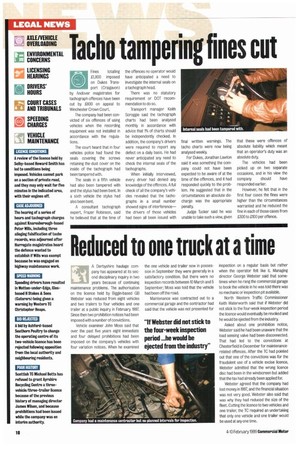Tacho tampering fines cut
Page 20

If you've noticed an error in this article please click here to report it so we can fix it.
Fines totalling
£1,800 imposed on Dukes Transport (Craigavon) by Andover magistrates for tachograph offences have been cut by £800 on appeal to Winchester Crown Court.
The company had been convicted of six offences of using vehicles when the recording equipment was not installed in accordance with the regulations.
The court heard that in four vehicles police had found the seals covering the screws retaining the dust cover on the inside of the tachograph had been tampered with.
The seals in a fifth vehicle had also been tampered with and the stylus had been bent. In a sixth vehicle the stylus had also been bent.
A consultant tachograph expert, Frazer Robinson, said he believed that at the time of the offences no operator would have anticipated a need to investigate the internal seals on a tachograph head.
There was no statutory requirement or DOT recommendation to do so.
Transport manager Keith Scroggie said the tachograph charts had been analysed monthly in accordance with advice that 1% of charts should be independently checked. In addition, the company's drivers were required to report any defect on a daily basis. He had never anticipated any need to check the internal seals of the tachographs.
When initially interviewed, every driver had denied any knowledge of the offences. A full check of all the company's vehicles revealed that the tachographs in a small number showed signs of interference— the drivers of those vehicles had been all been issued with
final written warnings. The tacho charts were now being analysed weekly.
For Dukes, Jonathan Lawton said it was something the company could not have been expected to be aware of at the time of the offences, and it had responded quickly to the problem. He suggested that in the circumstances an absolute discharge was the appropriate penalty.
Judge Tucker said he was unable to take such a view, given that these were offences of absolute liability which meant that an operator's duty was an absolute duty The vehicles had been picked up on two separate occasions, and in his view the company should have responded earlier.
However, he felt that in the first four cases the fines were higher than the circumstances warranted and he reduced the fine in each of those cases from £300 to 2100 per offence.








































































































